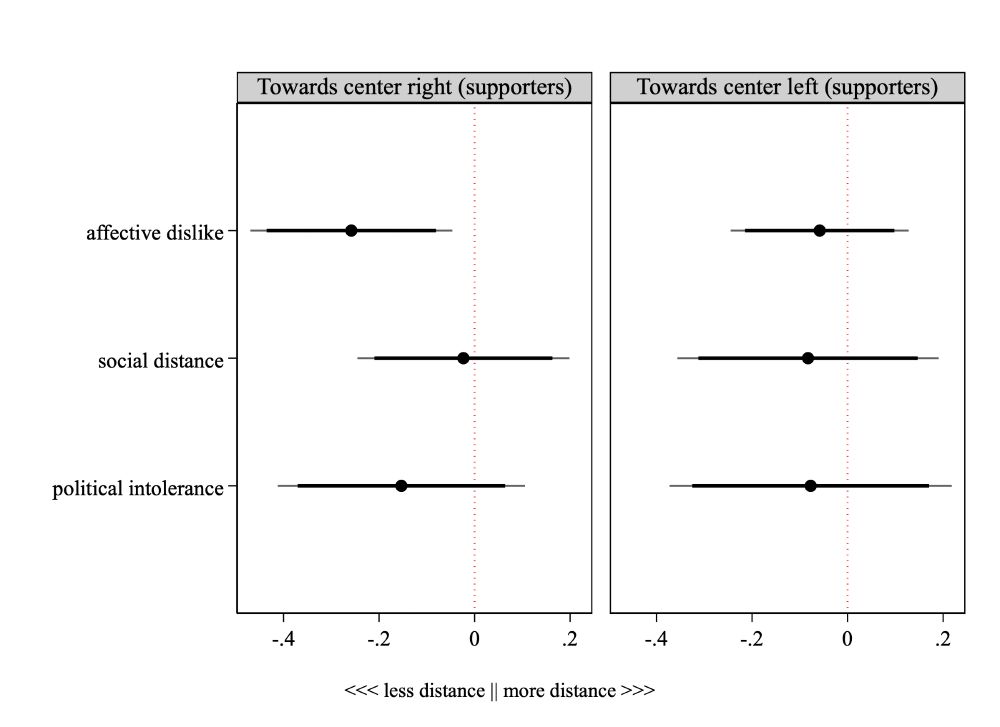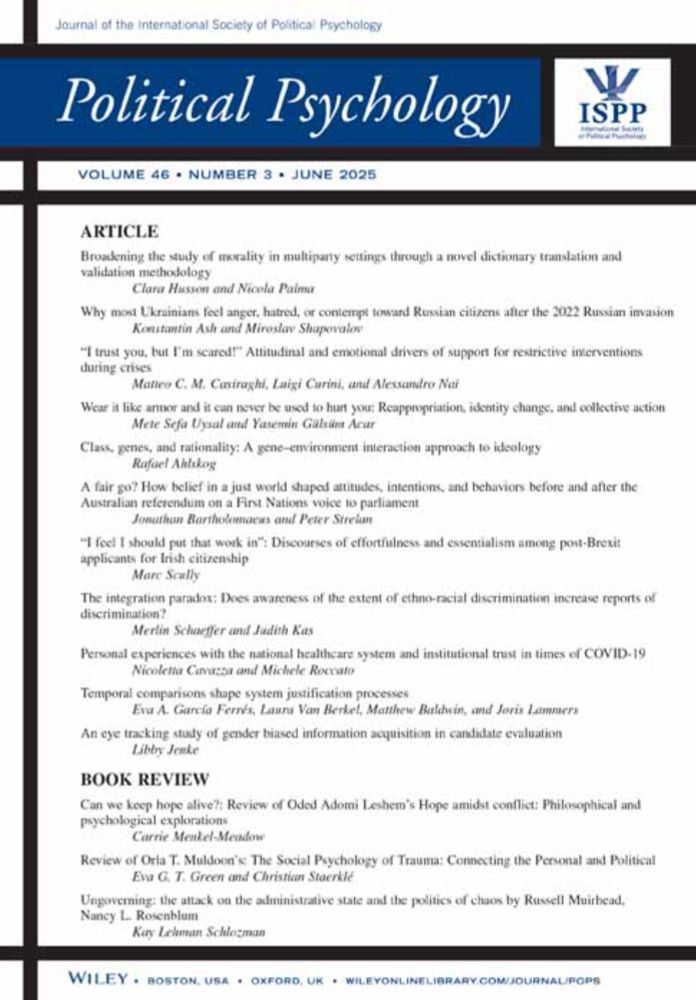💡 Edwin Jans, @rensvliegenthart.bsky.social, @skruikemeier.bsky.social en ik schreven een opiniestuk over polarisatie in Nederland, vandaag in @parool.nl 👇📰
08.10.2025 13:09 — 👍 10 🔁 4 💬 1 📌 0
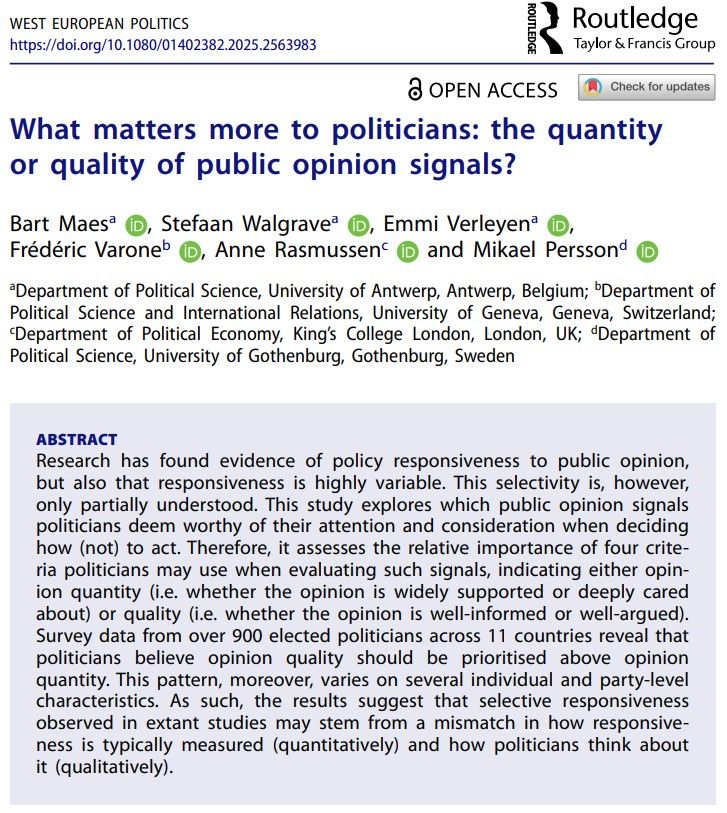
Politicians don’t just care how many people hold an opinion — they care how good that opinion is. In our new (open-access) article in West European Politics, based on survey data from 900+ politicians across 11 countries, we show: quality > quantity. Read more: doi.org/10.1080/0140...
03.10.2025 11:41 — 👍 31 🔁 9 💬 3 📌 0
Thank you for the kind words!
03.10.2025 07:39 — 👍 1 🔁 0 💬 0 📌 0
Thank you Daan!
01.10.2025 17:38 — 👍 1 🔁 0 💬 0 📌 0
Thank you!
01.10.2025 17:38 — 👍 0 🔁 0 💬 0 📌 0

Finally: even in places with a strong cordon sanitaire, coalition signals still mattered. Elite-led boundaries against the radical right seem to erode (very) quickly. Indeed, we find evidence that among the mainstream in 🇩🇪🇧🇪 (strong cordon sanitaire), attitudes are not that different from 🇪🇸🇦🇹.
01.10.2025 15:26 — 👍 0 🔁 0 💬 1 📌 0
So, potential inclusion of the radical right does not reduce polarization overall, but is a double-edged sword: while it decreases the affective gap between the mainstream right & radical right, it deepens the rift between the mainstream left and mainstream right.
01.10.2025 15:26 — 👍 1 🔁 0 💬 1 📌 0
All over Europe, mainstream parties face a dilemma: exclude the radical right or cooperate with them. Using pre-registered survey experiments in 🇩🇪🇧🇪🇪🇸🇦🇹 (N = 5,594), we examine the effect of coalition signals from the center right to the radical right on affective polarization and political tolerance.
01.10.2025 15:26 — 👍 1 🔁 0 💬 1 📌 0

🚨 New publication out @jeppjournal.bsky.social w/ Katrin Praprotnik @luanarusso.bsky.social @markuswagner.bsky.social
We show that coalition signals from the mainstream right to the radical right shift, rather than reduce, existing political divisions.
Open-access article: doi.org/10.1080/1350...
01.10.2025 15:26 — 👍 66 🔁 25 💬 3 📌 3
Happy to see that my paper w\ @jochemvanagt.bsky.social now has issue- and page-numbers.
Also check-out our post @ecprtheloop.bsky.social to learn more about why unsuccessful coalitions - like those that we see across the EU right now - do not mitigate polarization!
theloop.ecpr.eu/coalition-go...
23.09.2025 11:28 — 👍 9 🔁 2 💬 0 📌 0

United in success, fragmented in failure: The moderating effect of perceived government performance on affective polarization between coalition partners
JOCHEM VANAGT, MARKUS KOLLBERG
📘 64.4
✅ Coalition governments reduce affective #polarization when perceived as successful; ❌ when seen as failing, they increase polarization says @jochemvanagt.bsky.social & @markuskollberg.bsky.social
#OA #PoliSky
🔗
23.09.2025 11:02 — 👍 3 🔁 3 💬 0 📌 1

🚨 New working paper alert 🚨
Missing summer — and the Tour de France? Don’t worry, we got you covered. 🚴♂️🚴♂️🚴♂️
In this paper, we show that being on the route of Tour de France reduces far-right voting. osf.io/preprints/so...
16.09.2025 10:25 — 👍 266 🔁 88 💬 15 📌 33
OSF
What do citizens imagine their political opponents to be like? Polarization is real, but it also lives in our heads, fueled by stereotypes. We asked people in 🇧🇷, 🇬🇧, 🇩🇪 & 🇵🇱 to describe opponents in their own words.
With @jnareal.bsky.social, @markuswagner.bsky.social & @piotrmarczynski.bsky.social 👇
10.09.2025 12:02 — 👍 30 🔁 9 💬 1 📌 2

Radical right accommodation really does not work.
New paper out with this exceptionally talented team
@katharinalawall.bsky.social @robjohns75.bsky.social @drjennings.bsky.social @sarahobolt.bsky.social @zachdickson.bsky.social @danjdevine.bsky.social & @jack-bailey.co.uk
doi.org/10.31235/osf...
05.09.2025 06:50 — 👍 2178 🔁 986 💬 58 📌 173
We have a new paper out in @jepsjournal.bsky.social, with @laiabalcells.bsky.social, @sergisme.bsky.social and Ethan vanderWilden.
We test a number of experimental treatments aimed at strengthening social norms against radical-right support, but find mostly null results.
1/3
31.07.2025 14:56 — 👍 66 🔁 24 💬 2 📌 0

Abstract of the article "Defending democracy: investigating the efficacy of elite democratic defence in a competitive information environment" by Joep van Lit and Maurits Meijers. Published online first in West European Politics.

Figure 1, displaying the experimental block in the survey.

Figure 3, displaying the point estimates and 95% confidence intervals from OLS regressions on three different models.

Figure 4, displaying the marginal means with 95% confidence intervals of the effects of different types of democratic defence.
Online first: "Defending democracy: investigating the efficacy of elite democratic defence in a competitive information environment" by @jmvanlit.bsky.social & @mauritsmeijers.bsky.social
doi.org/10.1080/0140...
#Academicsky #Polisky
09.07.2025 07:47 — 👍 15 🔁 4 💬 0 📌 1

Political Trust and Electoral Behavior Among 16- and 17-Year-Old First-Time-Voters in Belgium
Abstract. Citizens’ electoral behaviors tend to persist over time and are driven by long-standing political attitudes acquired during the formative years o
📢 New publication: we draw on unique data from 16- and 17-year-old Belgian adolescents who were eligible to vote in the 2024 European elections, and show that low trust in order and representative institutions is linked to protest and radical voting. @dieterstiers.bsky.social @annakern.bsky.social
01.07.2025 09:42 — 👍 17 🔁 7 💬 1 📌 2
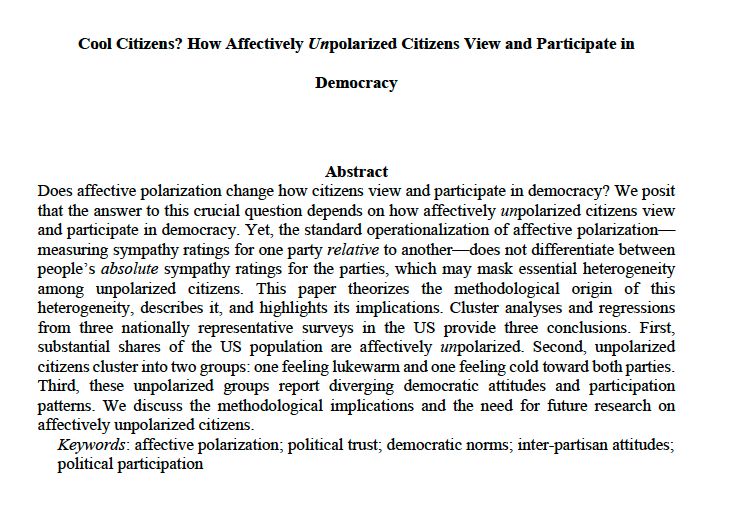
🚨Preprint alert🚨
How does affective polarization change democracy? Lots of pubs study how AP affects trust, democratic norms, inter-partisan attitudes, and participation.
We (w/ @polpsychjoe.bsky.social, @lilymasonphd.bsky.social) examine a vital assumption this research seems to rely on:
1/6🧵
24.06.2025 13:43 — 👍 54 🔁 24 💬 2 📌 2
Doctoral scholarship holders in political science | University of Antwerp
YUFE vacancies
🧵 Hiring 2 PhDs in political science!
Join my ERC project DEMO-LIES
@uantwerpen.be
🇧🇪
We study how politicians accuse each other of lying/disinfo — and how citizens react: Does it erode trust? Polarize? Mobilize? 🧠🗳️
💥 4-yr fully funded
📅 Start: Oct/Nov 2025
🗓️ Deadline: 21 Aug
Details + apply 👇
24.06.2025 16:05 — 👍 53 🔁 49 💬 0 📌 0

2 PhD positions in Electoral behavior
2 PhD positions to research how social group memberships become connected to vote choices
I'm recruiting 2 PhD researchers to work with me on a project studying how social groups influence vote choices!
Info on the position and how to apply 👉 www.kuleuven.be/personeel/jo...
Please share with interested students who would like to move to beautiful Leuven!
03.06.2025 07:35 — 👍 79 🔁 91 💬 1 📌 3
📢 The final piece of my dissertation is out in @polbehavior.bsky.social! Does being an ideologue matter for political disagreement—beyond how many issues are involved? It does, shaping both animosity and how people engage. 🧵https://doi.org/10.1007/s11109-025-10049-z
27.05.2025 12:35 — 👍 13 🔁 6 💬 4 📌 1
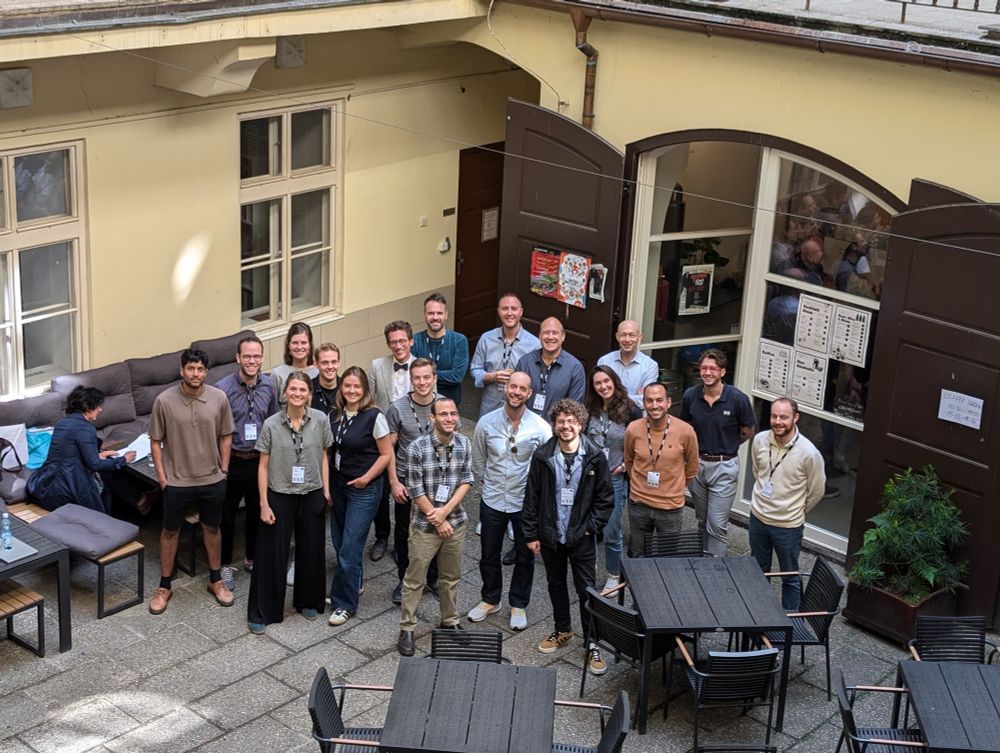
What a pleasure to direct this amazing @ecpr.bsky.social Joint sessions workshop on citizens democratic commitment with Hannah Werner - thanks to all participants for the exciting papers and stimulating discussions!
24.05.2025 08:08 — 👍 38 🔁 8 💬 3 📌 3
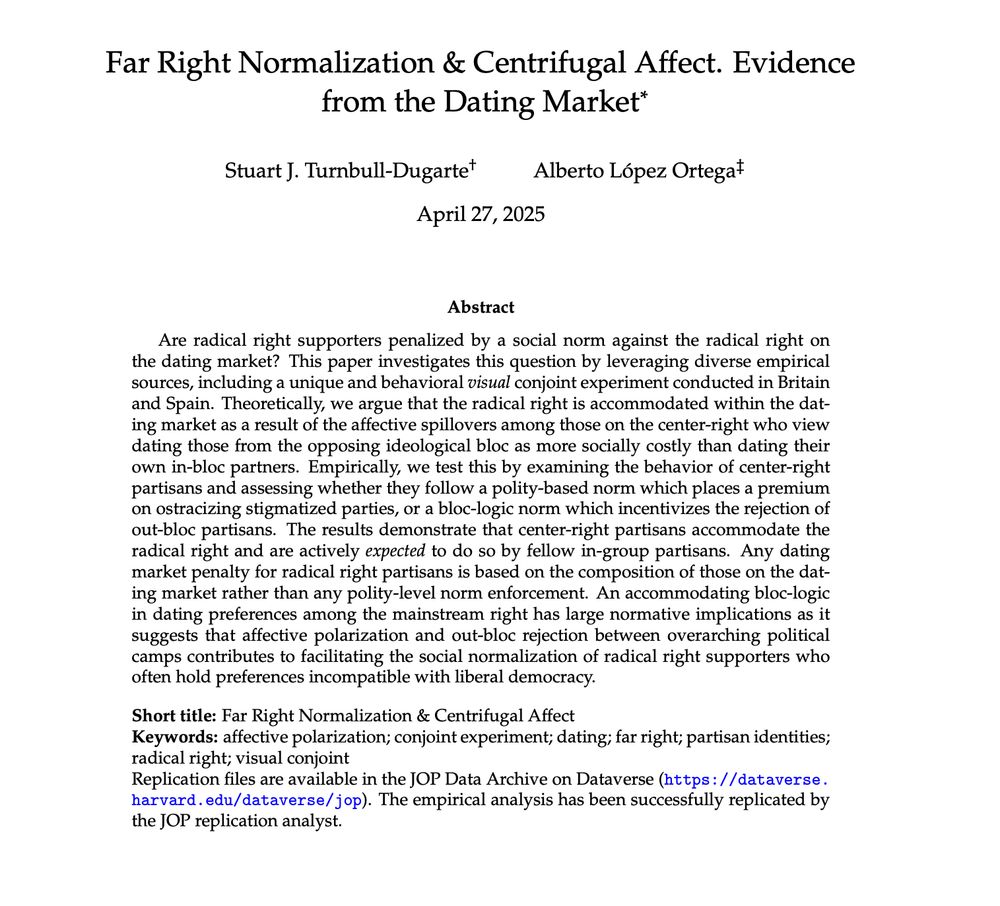
A Tinder Test of Democratic Norms💋
New paper in @thejop.bsky.social with @bertous.bsky.social
We rely on a visual conjoint experiment, cross-sectional data, & panel data to show that affective polarization drives the normalisation of the far right among the centre-right 🇬🇧🇪🇸
doi.org/10.1086/736698
19.05.2025 08:09 — 👍 285 🔁 119 💬 10 📌 25
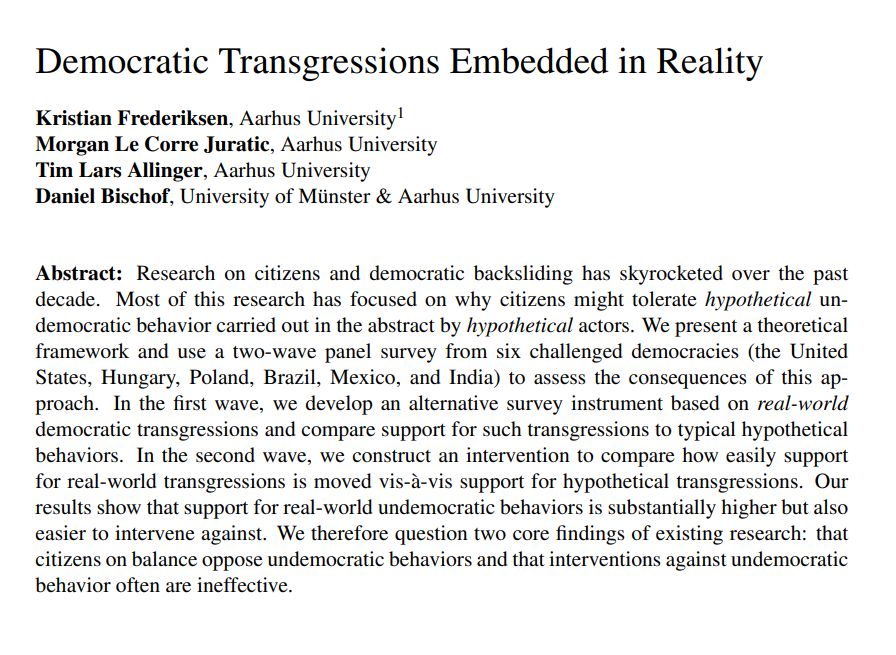
🛎️New WP with @morganlcj.bsky.social @timallinger.bsky.social and @danbischof.bsky.social
Against the surge of conjoints and other hypothetical experiments in relation to democratic backsliding, we study the consequences of using hypotheticals versus real-world scenarios.
osf.io/preprints/os...
14.05.2025 10:06 — 👍 54 🔁 19 💬 1 📌 2
Government and Opposition is an international journal of comparative politics published by Cambridge University Press. Fully open access from 2025.
Access all our content here: https://www.cambridge.org/core/journals/government-and-opposition
Political Scientist @unipotsdam.bsky.social
- Comparative Politics, Political Parties & Voting Behavior
- Quantitative Methods & R
Prev. Uni Vienna, Humboldt Uni & WZB Berlin
https://krausewe.github.io
PhD candidate at KU Leuven
Assistant Professor at Bocconi University. Research on immigration, refugees, political violence. https://www.ala-alrababah.com
PhD Candidate in Political Sociology researching stereotypes, perceptions, trust, and attitudes.
I am passionate about political communication and stand-up comedy, which are often the same thing.
assistant professor @AmericanU. working on countering misinformation in developing countries. @upenn.edu PhD in polisci & philly sports fan
📍washington, dc
https://sumitrabadrinathan.github.io/
Professor of Sociology, Psychology, & Org Behavior
@ Stanford. Director of Polarization and Social Change Lab (@pascl-stanford.bsky.social), Co-Direct Stanford Center on Philanthropy and Civil Society. Obsessive basketball fan
Assistant Professor @AarhusUni.
Researching how public opinion dynamics sustain regimes or facilitate regime change.
Comparative politics | Political behavior | Authoritarianism | Democracy
https://www.lauritsaarslew.com
Professor of political science @SciencePoULB | Cevipol
Parties, elections, participation
Professor University of Zurich @ipz.bsky.social — interested in comparative politics & data science — representation, participation, direct democracy — @leewas.bsky.social — @bjpols.bsky.social — DigDemLab — Co-founder of
https://leewas.ch/
JEPP is a flagship journal covering public policy, Europ. politics & the EU | Edited by B.Rittberger | https://www.tandfonline.com/journals/rjpp20 | https://www.linkedin.com/company/jepp/ | https://www.facebook.com/profile.php?id=61573881511255
PhD researcher at the University of Antwerp. Researching how political elites deal with public opinion.
Professor of Comparative Political Behavior, Humboldt Universität Berlin || Spokesperson DYNAMICS @dynamics.bsky.social ||
Director Humboldt Governance Lab @humboldt-govlab.bsky.social
https://heike-kluever.com/ https://hu-govlab.de/
CPS offers scholarly work on comparative politics at both the cross-national and intra-national levels. Edited by Ben Ansell, David Samuels, and Dawn Teele.
European Political Science Review (EPSR) is an #OpenAccess journal of the European Consortium for Political Research (ECPR).
The European Political Science Society: the not-for-profit professional association for political science in Europe and beyond
https://epssnet.org/
Political science PhD @univie.ac.at | she/her
Researching how citizen respond to independent politicians | Political behavior, parties, technocracy, women & politics
https://jeannezmarlier.notion.site/
Publishing original and substantial contributions to the study of comparative European politics. A journal from the European Consortium for Political Research (ECPR) https://ejpr.onlinelibrary.wiley.com/journal/14756765
Political psychologist at KU Leuven
PhD candidate at the University of Amsterdam,
AI, Culture & Society research unit @ ILLC.
Social identity / morality / affective polarisation / computational social science.





